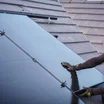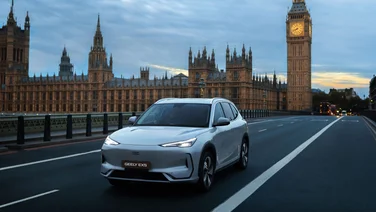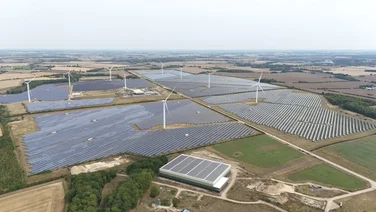- Chancellor Rachel Reeves is set to deliver her budget on 26 November
- The government released a Carbon Budget and Growth Delivery Plan in late October
- Clean technology experts are urging ministers to cut the Spark Gap

One of the central questions ahead of the Budget on the 26 November is what Rachel Reeves will do to cut household energy bills?
The question is huge because it affects some major policy promises the Labour Party made before it took office in 2024: to bring down energy bills, to invest heavily in clean energy and, perhaps most importantly, not to increase taxes.
Despite the publication of the government’s Carbon Budget and Growth Delivery Plan last week, the general public is still none the wiser as to what the government will do next on the topic of energy bills and how it will be paid for.
The clean tech sector is clear about what ministers need to do, and that is to cut the link between what consumers pay for their energy and the wholesale price of gas. This is the very thing that makes electricity more expensive than gas, and it is holding back the UK’s own heat pump roll-out targets, as well as stopping it from becoming energy independent.

Get free heat pump quotes
Answer a few quick questions, and our trusted installers will send you bespoke heat pump quotes – for free.
What is the Spark Gap?
This difference in price between gas and electricity is commonly called the ‘Spark Gap’, the current difference means than electricity is about four times the cost of gas to households. Speak to anyone in the low-carbon tech sector, and they’ll tell you that the Spark Gap is one of the key obstacles that the government needs to overcome to drive down energy bills and incentivise people to decarbonise their homes.
The problem is that doing something about the Spark Gap is very difficult because the first step would likely force the government to break one of its key manifesto commitments: not to raise employee National Insurance contributions, income tax or VAT.
About 13.5% of the average household electricity bill is made up of policy costs – unofficially referred to as ‘green levies’ – which are charges that pay for carbon-cutting grants, such as the Boiler Upgrade Scheme.
These policy costs cannot be removed entirely, otherwise the UK’s whole green effort would come to halt, and equally they cannot be put onto gas bills as this would make prices significantly more expensive for the poorest households who rely on gas to heat their homes. Therefore, it’s widely accepted that the only way to keep them is to increase taxes.
If you think you’re paying too much for your energy, use our tool to compare and switch suppliers.
However, the longer the Spark Gap remains, the harder it will be to make the economic argument to install a heat pump, which in turn slows down roll out, and this in turn means fewer homes move from gas to electric, with the end result being UK households remain at the mercy of energy price shocks, such as the war between Russia and Ukraine.

Get free solar panel quotes
Answer a few quick questions, and our trusted installers will send you bespoke solar panel quotes – for free.
What will Rachel Reeves announce in the Budget?
At the moment, it’s hard to say.
Last week the government published its Carbon Budget and Growth Delivery Plan, which was generally positively received, despite its lack of detail.
The plan is designed to show that the government is still aiming to cut carbon emissions and energy bills through investment in clean technology.
Energy minister Ed Miliband said the plan sets out how the government will “unlock the benefits of clean energy and climate action”.
“By driving towards our carbon budgets, we will increase our energy security and lower bills, create good, well-paid jobs with strong trade unions and boost innovation, exports and economic growth,” Miliband insisted.
“The focus of this plan is about the right incentives for people to benefit from clean energy; from electric vehicles to home heating, we want people to be better off from the shift to clean energy.”
The reaction from the clean technology industry was warm, as most welcomed the renewed commitment, but it is telling that the plan didn’t include any new announcements but focused on how the original and previously-announced policies are set to be delivered instead.
There was nothing, for instance, on any action the government intends to take on the Spark Gap.
Nigel Topping, chair of the UK’s independent advisor on tackling climate change, the Climate Change Committee, summed up the general reaction by saying the group’s number one recommendation is to “make electricity cheaper” which can only be achieved by “taking policy costs off energy bills”.
He continued by saying that removing policy costs was “vital for ensuring the required scale-up of heat pump installations”.
The Energy Savings Trust (EST) also welcomed the plan but insisted more detail was needed. Abigail Ward, policy manager at the EST, said that reducing the reliance on fossil fuels “remains the single most important step in building a more secure, stable energy future”.
Sustainable economy advocates, the Aldersgate Group, also welcomed what it called the “clarity” the plan offered, but it also joined the EST and the CCC in calling on the government to “prioritise action on power prices” in the Budget and the Warm Homes Plan.
Whether we get that movement on breaking the Spark Gap anytime soon is a question only Chancellor Rachel Reeves can answer.
On top of last week’s Carbon Budget and Growth Delivery Plan, Reeves gave a pre-Budget speech on 4 November, the headline from which was that she refused to rule out raising taxes across the board, including income, wealth and capital gains.
While this may sound like bad news, it could potentially be a sign that there might well be a shift on the Spark Gap, with the policy costs finally being moved off electricity and into general taxation.
If they are moved, billpayers would benefit massively in the long run. According to climate think tank E3G the average household energy bill could be cut in half if the government removed green levies from electricity.
The think tank isn’t alone in its analysis. In April 2025, several major energy suppliers, including Octopus and Ovo, signed an open letter to the government, urging ministers to push the charges into general taxation.
As unpopular as it will be in the short term, paying for the policy costs in this way would be the sensible long term decision for the government’s plan to bring down energy bills.

Get free heat pump quotes
Answer a few quick questions, and our trusted installers will send you bespoke heat pump quotes – for free.







